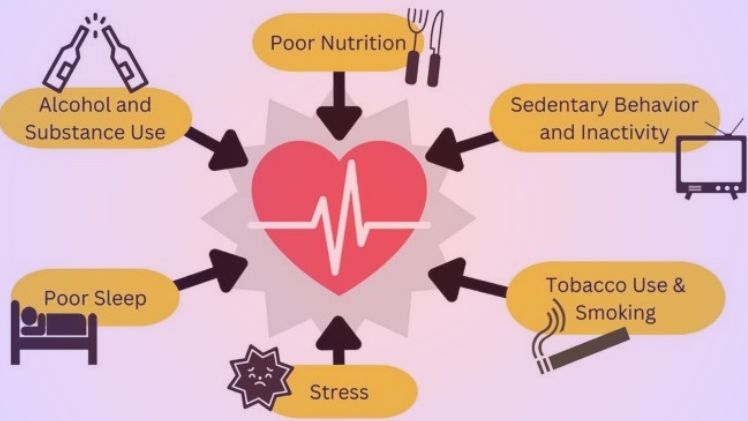The term “lifestyle factors” frequently surfaces in discussions about health and wellness. However, what does the phrase “define lifestyle factors” actually mean? Maintaining long-term physical and mental health requires an understanding of these issues and how they affect our lives.
This blog explores the meaning of lifestyle factors, their different kinds, and their effects on general health. We’ll also explore ways to improve these factors for a healthier lifestyle.
1. What Are Define Lifestyle Factors?
Define lifestyle factors refer to the daily habits, behaviors, and choices that shape an individual’s health and quality of life. These factors, whether positive or negative, influence physical, mental, and emotional well-being.
Key Characteristics of Lifestyle Factors:
- They are controllable and modifiable.
- They affect long-term health outcomes.
- They include a wide range of behaviors and environmental influences.
Examples include diet, exercise, sleep, stress management, substance use, and social relationships.
2. Types of Define Lifestyle Factors
1. Physical Activity
Regular exercise improves cardiovascular health, builds strength, and reduces the risk of chronic illnesses like diabetes.
2. Nutrition
Eating a balanced diet with plenty of fruits, vegetables, and whole grains supports physical and mental health.
3. Sleep
Quality sleep is vital for cognitive function, immunity, and emotional resilience.
4. Stress Management
Numerous health problems might result from ongoing stress. Managing stress through mindfulness, yoga, or therapy is essential.
5. Substance Use
Avoiding harmful substances like tobacco and limiting alcohol consumption are critical lifestyle factors.
6. Social Relationships
Strong social connections improve mental health, boost immunity, and enhance overall happiness.
3. Why Are Define Lifestyle Factors Important?
Define lifestyle factors are crucial because they directly impact the risk of developing chronic diseases. A sedentary lifestyle, poor diet, and high-stress levels can lead to obesity, heart disease, and diabetes. Conversely, a healthy lifestyle can prevent or even reverse these conditions.
Key Benefits of Optimizing Lifestyle Factors:
- Increased life expectancy.
- Improved mental clarity and emotional stability.
- Reduced healthcare costs.
4. The Role of Lifestyle Factors in Chronic Disease Prevention
Chronic diseases, such as heart disease, diabetes, and hypertension, are often linked to poor lifestyle choices. Addressing these factors can significantly reduce the risk of these conditions.
For example:
- Healthy Eating: Reduces the risk of obesity and related conditions.
- Regular Exercise: Strengthens the heart and improves insulin sensitivity.
- Stress Reduction: Lowers blood pressure and cortisol levels.
5. The Interconnection Between Define Lifestyle Factors
Define lifestyle factors do not exist in isolation. For instance, poor sleep can lead to unhealthy eating habits and decreased physical activity, creating a cycle that negatively impacts health. Conversely, improving one factor often positively influences others.
Example of Interconnection:
- Regular exercise improves sleep quality.
- Healthy eating enhances energy levels for physical activity.
6. How to Improve Define Lifestyle Factors
Making small, sustainable changes can improve lifestyle factors.
Tips for Improvement:
- Diet: Include an additional serving of veggies in each meal.
- Exercise: Start with 10 minutes of walking daily and gradually increase.
- Sleep: Maintain a consistent bedtime routine.
- Stress: Practice mindfulness for five minutes daily.
- Social Links: Arrange frequent get-togethers with loved ones.
7. Barriers to Improving Define Lifestyle Factors
Despite the benefits, several barriers can hinder improvement. Common issues include a lack of time, inadequate resources, and inaccurate information.
Strategies to Overcome Barriers:
- Create a realistic and personalized plan.
- Seek support from healthcare providers or wellness coaches.
- Utilize technology to monitor your progress, such as fitness applications.
8. The Role of Healthcare Providers in Lifestyle Management
Healthcare professionals play a pivotal role in helping individuals identify and modify lifestyle factors. They can provide guidance, support, and evidence-based interventions tailored to personal needs.
9. Examples of Positive and Negative Define Lifestyle Factors
Positive Lifestyle Factors:
- Eating nutrient-dense foods.
- Exercising regularly.
- Building a strong social support network.
Negative Lifestyle Factors:
- Smoking and excessive alcohol consumption.
- Consuming a diet high in processed foods.
- Leading a sedentary lifestyle.
10. The Future of Define Lifestyle Factors in Healthcare
As awareness grows, Define lifestyle factors are becoming central to preventive medicine. Programs and policies promoting healthy behaviors are being integrated into healthcare systems worldwide.
Emerging Trends:
- Digital health tools for lifestyle tracking.
- Workplace wellness programs.
- Community-based health initiatives.
Conclusion
Define lifestyle factors encompass the habits and behaviors that shape our health and quality of life. By understanding and optimizing these factors, we can significantly enhance our physical and mental well-being.
The journey to a healthier lifestyle begins with small, deliberate changes. Whether it’s adopting a balanced diet, prioritizing sleep, or building meaningful relationships, every step counts. Take charge of your lifestyle factors today, and embrace a future of better health and happiness.
FAQs
1. What are lifestyle factors in simple terms?
Define lifestyle factors are habits and behaviors, such as diet and exercise, that influence your overall health and well-being.
2. Can lifestyle factors reverse chronic diseases?
Yes, in many cases, improving lifestyle factors like diet and exercise can prevent or even reverse chronic conditions like type 2 diabetes.
3. How do lifestyle factors affect mental health?
Positive lifestyle factors, such as regular exercise and strong social connections, can improve mood, reduce stress, and enhance mental health.
4. What is the most important lifestyle factor?
While all Define lifestyle factors are essential, nutrition often plays a critical role in overall health as it directly affects energy levels and bodily functions.
5. How can I improve my lifestyle factors?
Start small by incorporating healthier habits, like walking daily or adding more vegetables to your meals, and gradually build on these changes.

